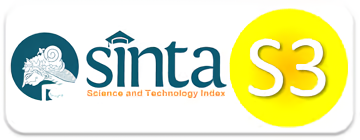COSO's Enterprise Risk Management Framework in Agriculture Startup to Support the Achievement of SDGs Pillars
Downloads
COSO's Enterprise Risk Management (ERM) is considered to increase the added value of the firm. This study's primary purpose is to discuss the implementation of the COSO's ERM framework on agricultural startup in supporting the achievement of the SDGs pillars. Data collection methods used are questionnaires. This research uses qualitative and quantitative analysis using the Smart PLS application. It aims to determine the effect of implementation of COSO's ERM as an added value to agricultural startup as a goal to support the achievement of SDGs pillars. Overall, the implementation of COSO's ERM at the startup of Sayurbox has a significant effect in supporting the achievement of the economic, social and environmental SDGs pillars.
Berutu, H. C. (2018). 3 Fakta Revolusi Industri 4.0 pada Pertanian Indonesia. Jakarta: Pak Tani Digital.
BPS. (2019). Jakarta: Badan Pusat Statistik (BPS).
Care IPB. (2019, July 15). Care Institut Pertanian Bogor. Retrieved from Sosok Penyuluh pada Era Industri 4.0: http://care.ipb.ac.id/sosok-penyuluh-pada-era-industri-4-0/
COSO. (2017). Welcome to COSO. Retrieved from 2017 Enterprise Risk Management – Integrated Framework: https://www.coso.org/Pages/default.aspx
Fakultas Pertanian UGM. (2019). Membangun Ekosistem Digital Sektor Pertanian di Era Revolusi Industri 4.0. Yogyakarta: Fakultas Pertanian UGM.
Fery. (2016, May 23). Corporate Governance: Komite Audit. Retrieved from Fakultas Ekonomi Online: http://fekool.blogspot.com/2016/05/corporate-governance-komite-audit.html
Handoko, B. L., Septianto, D., & Alyssa. (2019). Aplikasi Penggunaan Enterprise Risk Management (ERM) Integrated Framework COSO untuk Mendeteksi Risiko Kecurangan. UPH Journal of Management, 2-4.
Jabal. (2019, May 5). Indonesia Menuju Industri Pertanian Digital 4.0. Yogyakarta, Daerah Istimewa Yogyakarta, Indonesia: Kompasiana.
Kuncoro, M. (2007). Metode Kuantitatif, Teori dan Aplikasi Untuk Bisnis dan Ekonomi. Yogyakarta: Upp STIM YKPN.
Luthfi, M. M. (2019). Mengenal Sustainable Development Goals (SDGs) 2045. CloudHost.
Pamungkas, A. (2019). Pengaruh Penerapan Enterprise Risk Management (COSO) Terhadap Nilai Perusahaan: Studi Empiris pada Perusahaan Manufaktur yang Terdaftar di BEI. Jurnal Akuntansi Maranatha, 12-21.
Perdana, T. (2015). Perkembangan Rantai Pasok Pertanian di Indonesia. Bandung: Artikel Logistik Agrobisnis.
PPIC. (2017). Mengenal Metode Peramalan (Forecasting) Dalam Dunia Industri. Indonesian Templates.
Prasongko, D. (2019). Menteri Perdagangan: Harbolnas 2019 Tawarkan Produk Pertanian. Jakarta: Tempo.co.
Pratama, A. H. (2016). Jokowi Perkenalkan 5 Startup Pertanian dalam Sinergi Aksi untuk Ekonomi Rakyat. Jakarta: Tech in Asia.
Rahayu, N. (2019). Begini Revolusi Industri 4.0 di Sektor Pertanian. Jakarta: Warta Ekonomi.
Sekaran, U., & Bougie, R. (2017). Metode Penelitian untuk Bisnis. Jakarta: Salemba Empat.
Soetedjo, S., & Sugianto, A. (2018). Penerapan COSO ERM Integrated Framework dalam Mendukung Audit Forensik untuk Menanggulangi Tindakan Kecurangan. Journal of Applied Managerial Accounting Vol. 2, 262-274.
Sofuroh, F. U. (2019). Indonesia Masuk 5 Besar Eksportir Pertanian Terbaik di Dunia. Jakarta: Detikfinance.
Sugiyono. (2017). Metodologi Penelitian Kuantitatif Kualitatif. Bandung: Alfabeta.
Sutopo, A., & Arthati, D. F. (2014). Kajian Indikator Sustainable Development Goals (SDGs) . Jakarta: Badan Pusat Statistik.
Tobing, S. (2019). Sektor Industri Masih Penyumbang Terbesar Pertumbuhan Ekonomi. Jakarta: katadata.
Zamzami, F., Faiz, I. A., & Mukhlis. (2018). Audit Internal Konsep dan Praktik. Yogyakarta: Gadjah Mada University Press.
Copyright notice:
- Authors retain copyright and grant the journal right of first publication with the work simultaneously licensed under a Creative Commons Attribution-NonCommercial-ShareAlike 4.0 International License that allows others to share the work with an acknowledgement of the work's authorship and initial publication in this journal.
- Authors are able to enter into separate, additional contractual arrangements for the non-exclusive distribution of the journal's published version of the work with an acknowledgement of its initial publication in this journal.
- Authors are permitted and encouraged to post their work online (e.g., in institutional repositories or on their website) prior to and during the submission process, as it can lead to productive exchanges, as well as earlier and greater citation of published work (See The Effect of Open Access)
















